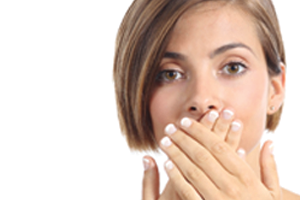About 25% to 30% of the world’s population suffers from chronic bad breath, or halitosis. It can be a problem for many reasons, but mostly, it’s embarrassing. Bad breath can strike at any time, and sometimes indicates more-serious dental problems. If you have bad breath, learn how to avoid it, as well as when to seek professional help.
Brush and Floss
This is your best defense against bad breath. Bad breath happens when plaque and tartar cause sticky buildup on and around your teeth. Trapped food can cause problems, too. Be vigilant about brushing and flossing if your favorite foods are naturally sticky or if you often snack on things like popcorn; hulls can get trapped easily. Floss at least once a day and brush at least twice. Do so gently; brushing too hard will make your teeth weaker.
Brush Your Tongue, Too
The tongue often traps bacteria, so brush your tongue while taking care of your teeth. Use a scraper if your brush doesn’t reach the back of your tongue. Despite the name, scrapers are gentle and are often better than toothbrushes because they apply even pressure across the entire tongue. Scrapers also remove dead cells that brushes do not.
Watch What You Eat
Most people know not to eat onions or garlic before going to work, meeting friends, or otherwise interacting in public because they cause bad breath. What you may not know is the compounds in these foods travel to your lungs, so you breathe out the odors hours after brushing or flossing. Avoid these foods if you have frequent bad breath. Fish, eggs, leeks, and certain cheeses are offenders, too.
Go for Sugarless Gum
Resist the temptation to pop a mint. Most are made with sugar, which bacteria love. Mints and sugary gum help bacteria form acid, which weakens your teeth and causes bad breath. Use sugarless gum instead.
Keep Your Mouth Wet
A dry mouth is bacteria’s favorite breeding ground, so keep yours as wet as possible. Drink plenty of water and avoid soda and juices. If your mouth still feels dry, use sugarless gum to stimulate saliva. Breath spray might be an option, but ask your dentist for a recommendation. Consider using a humidifier at night if your mouth is chronically dry.


